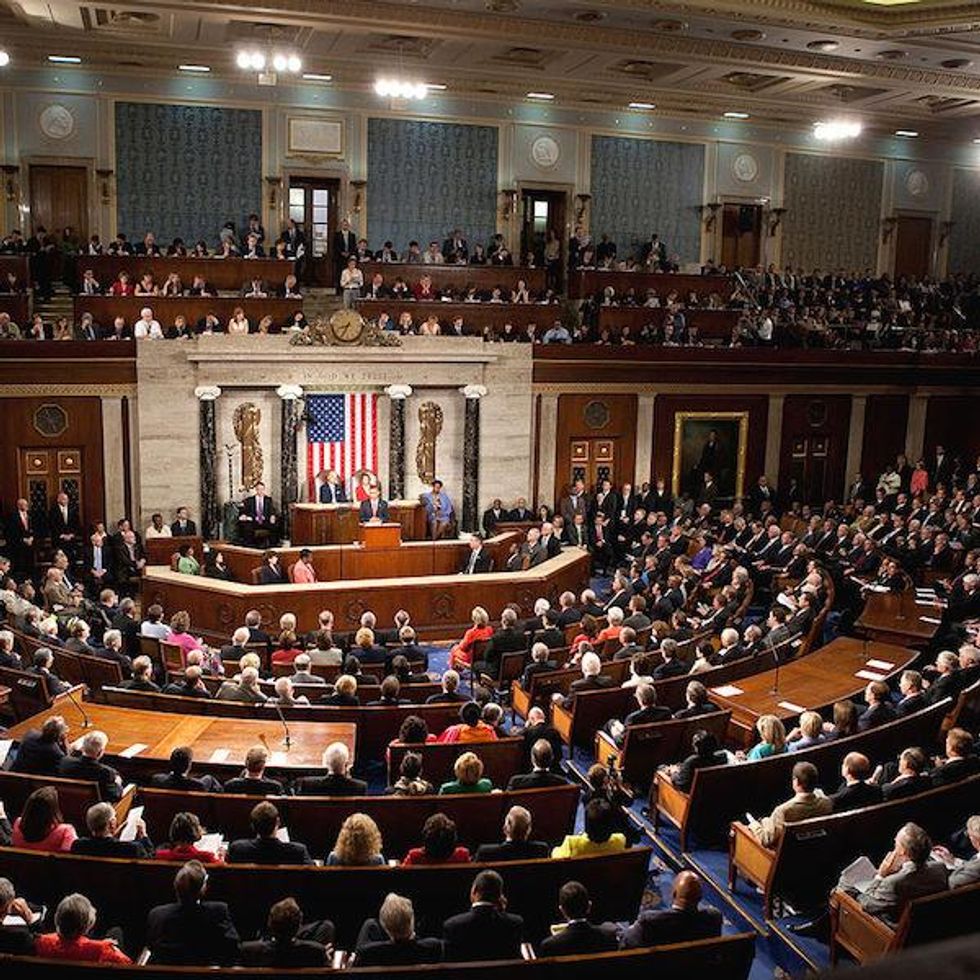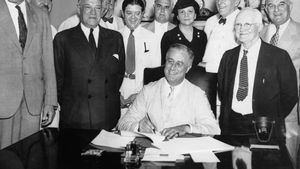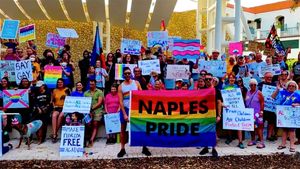Legislation will be introduced in Congress on Thursday to amend the Civil Rights Act of 1964 and other federal laws to protect LGBT people from discrimination, The Advocate has learned.
Democrats Jeff Merkley of Oregon, Tammy Baldwin of Wisconsin, and Cory Booker of New Jersey are the lead sponsors in the Senate; David Cicilline of Rhode Island, also a Democrat, will be the lead sponsor in the House.
A copy of the proposed legislation, widely circulated among LGBT and other progressive organizations and obtained by The Advocate, show that The Equality Act would include protections in public accommodations, public education, employment, housing, federal funding, jury service, legal protections, and credit. The bill would also clarify that the Religious Freedom Restoration Act cannot be used to defend discrimination against LGBT people.
The legislation also clarifies that sex-segregated facilities must admit individuals in accordance to their gender identity, and that it applies to anyone discriminated against because of their perceived sexual orientation or gender identity or association with a protected class.
Rep. Cicilline and Sen. Merkley will hold a news conference on Thursday to announce the legislation's introduction. Sen. Baldwin and Congressman Cicilline are both out legislators while Merkley and Booker are forceful allies for LGBT rights.
The measure has been in the works for months, as The Advocate reported in April. It was first announced by Merkley in December. The co-directors of GetEQUAL, Heather Cronk and Angela Peoples, wrote an Advocate op-ed last month that they saw the legislation as "dangerous," fearing right-wing lawmakers would not only strip the bill of its intended protections with amendments, but also gut the civil rights laws being amended.
The Human Rights Campaign applauded the initiative. "No one in our community should be at risk of being fired, evicted from their home, or denied services because of who they are or whom they love," said HRC President Chad Griffin.
"There is an unacceptable patchwork of state-level protections for LGBT people, and more than half of LGBT Americans live in a state that lacks fully-inclusive non-discrimination laws. The time has come in this country for full, federal equality, and nothing less. A federal non-discrimination bill would create permanent and clear protections to ensure that all employees are hired, fired or promoted based on their performance. All LGBT Americans deserve a fair chance to earn a living and provide for their families."
In a "Dear Colleague" letter sent to other legislators seeking co-sponsors, Rep. Cicilline explained the need for the legislation following the Supreme Court's ruling in favor of marriage equality. Cicilline warns lawmakers that the fight for LGBT rights isn't over; instead, it's just begun.
"Every day, millions of LGBT Americans face the danger of real discrimination and sometimes even violence because of their sexual orientation or gender identity," Cicilline writes. "In most states, a same-sex couple can get married on Saturday, post pictures on Facebook on Sunday, and then risk being fired from their job or kicked out of their apartment on Monday."
The Equality Act would make sweeping changes to federal civil rights law. One of the most notable, and likely controversial, sections would expand the list of businesses listed as public accommodations to include banks, retail stores, and companies that provide transportation and health care services - covering nearly every business that provides goods or services.
Republicans in Congress have been rushing to the defense of businesses like florists and bakers who've refused to provide services for LGBT couples getting married. They argue that the business owners' religious freedom is being violated and have introduced federal legislation that would allow them to discriminate. The first committee hearing on the Republican bill will coincide with the introduction of the Equality Act. Similar laws in Indiana and Arkansas have drawn fire in the past year as opponents characterized it as legalized discrimination against LGBT people.
The Equality Act would also amend Title VII of the Civil Rights Act of 1964 to include employment protections for sexual orientation and gender identity. Religious beliefs, race, sex, color, and national origin are already protected classes. The bill would not change existing religious exemptions for religious corporations, schools, and associations to make hiring decisions based on religious beliefs if the employee will be performing work connected with their religious activities.
It would pertain to any public or private businesses with more than 15 employees as well as labor organizations. This is the same standard currently in place in the Civil Rights Act of 1964.
The bill would also update the Government Employees Rights Act of 1991 and the Civil Service Reform Act to include sexual orientation and gender identity protections for federal and District of Columbia government employees.
Other areas covered in the sweeping legislation include nondiscrimination protections for those seeking child welfare, public education, student loans, healthcare or nutrition assistance. LGBT people would also be protected from discrimination in any aspect of purchasing or renting a house.
The Equal Credit Opportunity Act and the Jury Service and Selection Act would also be amended to include sexual orientation and gender identity protections and would update the terms "husband" and "wife" to the more inclusive designation of "spouse."
Given the political dynamic in Washington, observers say passage of the legislation is unlikely in this Congress. No Republican co-sponsors have been announced so far. Instead, conservatives have focused on measures that would prevent the federal government from revoking tax exemptions or fining businesses that discriminate against gay, lesbian, or bisexual couples.

























































































Cooper Koch and twin bro spark controversy with eye-popping 'White Lotus' parody